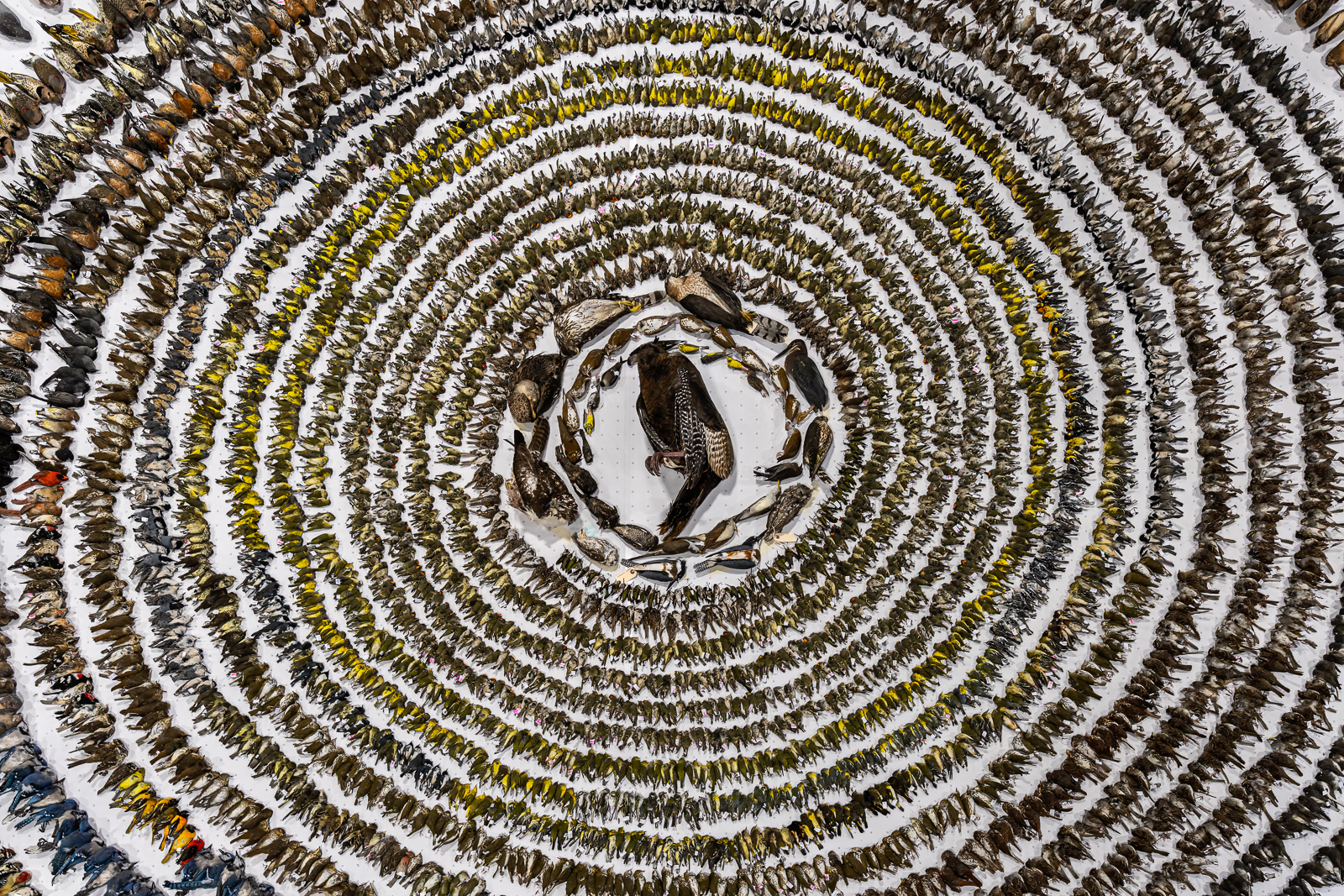
The winning images of the Bird Photographer of the Year 2024 competition have been selected, and this year the grand prize winner is an impactful and thought-provoking image that shows over 4,000 birds that were killed after colliding with windows in Toronto, Canada.
More than 23,000 images were entered into the competition, which is open to photographers worldwide, vying for the $4,675/£3,500/AU$8,600 grand prize.
The overall winner was captured by Canadian photographer Patricia Homonylo on her Sony A7R IV with a Sony FE 16-35mm f/2.8 GM II lens. Her shocking image, titled ‘When Worlds Collide’, shows birds killed in collisions with windows and other reflective surfaces in and around Toronto.
“Each year more than one billion birds die in North America alone due to collisions with windows,” says Homonylo. “I am a conservation photojournalist and have been working with the Fatal Light Awareness Program (FLAP), where we save window-collision survivors in Toronto. Sadly, most of the birds we find are already dead. They are collected and, at the end of the year, we create this impactful display to honor the lives lost and increase public awareness. I hope people are shocked by what they see and are moved to act by using bird-safe glass and supporting organizations like FLAP.”
According to FLAP, reflective surfaces like windows can appear to birds to be a continuation of the landscape behind them, and consequently they may fly into windows at full speed. The organization encourages the use of bird-safe films on windows, bird screens or window grills.
• Check the best lenses for bird photography
The adult competition had a total of eight categories, from which the overall winner was chosen: Best Portrait, Birds in the Environment, Bird Behaviour, Birds in Flight, Black and White, Urban Birds, Conservation (Single Image), and Comedy Bird Photo. There was also a Conservation Award, Portfolio Award, and Video Award.
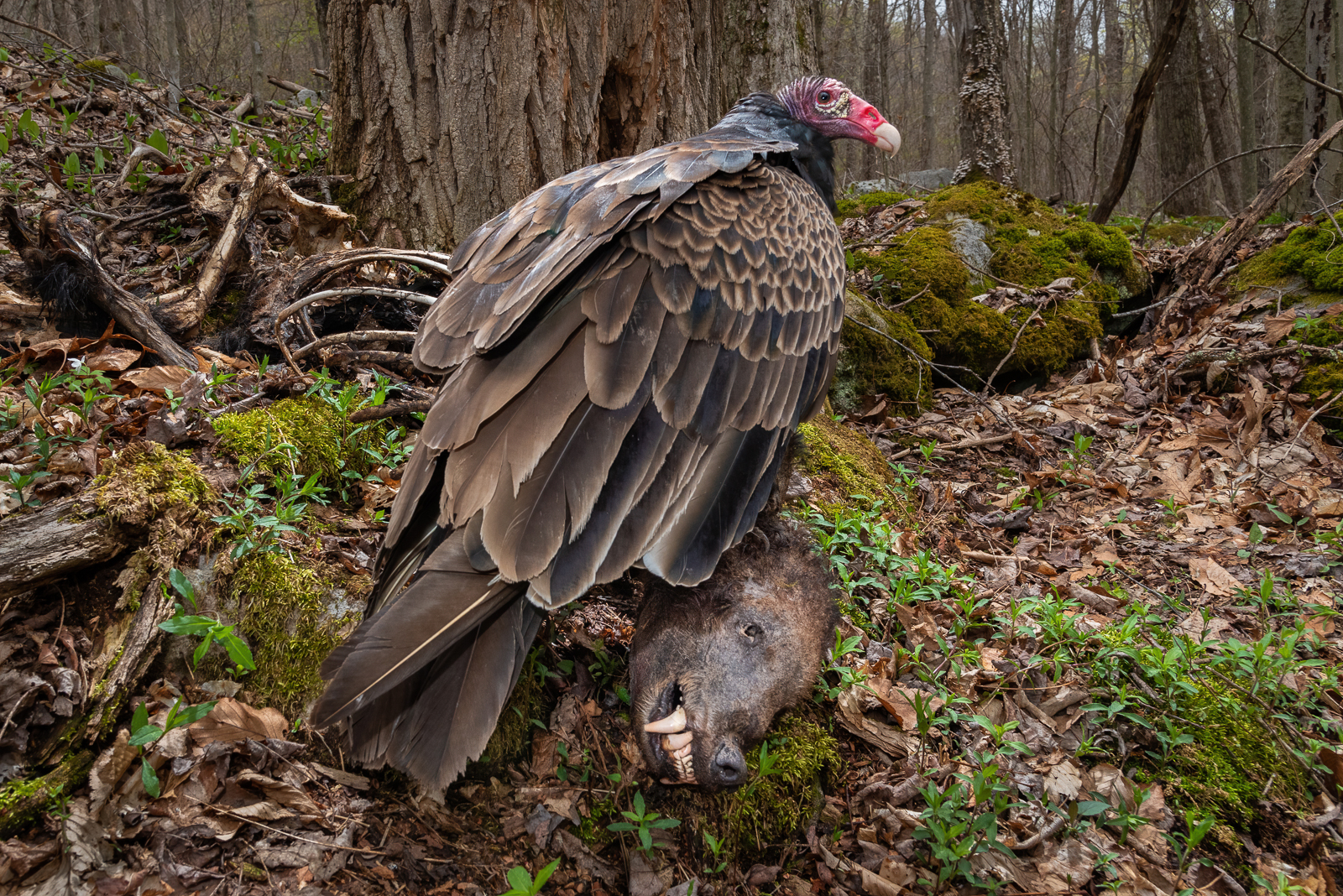
The winner of the Bird Behavior category was Nathaniel Peck, who said: "In early March 2023, the remains of an American Black Bear were discovered by hikers along a rushing mountain stream in West Virginia. It was very clear from the large patches of missing fur that the bear had died after a battle with mange. After being informed of the carcass and securing permission, I set up a DSLR camera trap that took images of all the animals that came in to investigate and scavenge off the bear. The set-up remained in place for six months. As the weather warmed in spring, this Turkey Vulture became a frequent visitor, sometimes spending hours at the carcass."
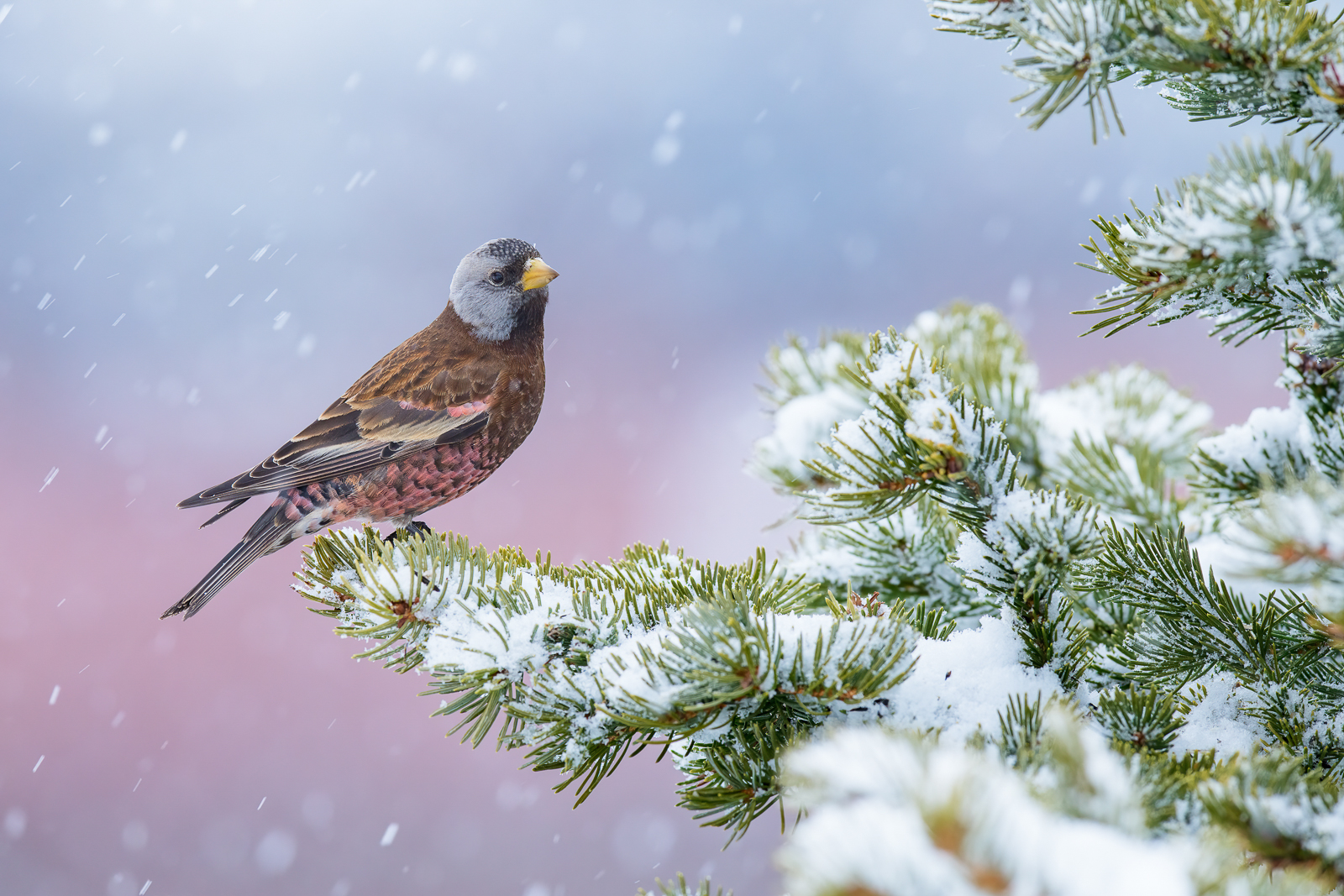
Best Portrait winner Alan Murphy commented: "During my stay in Alaska, Grey-crowned Rosy-finches would gather in large flocks next to my hotel. Fortunately for photographers, they are a very tame species and they allowed me to set up my tripod and camera to grab a few frames before they all took off. The colours in the background are distant boats in a marina."
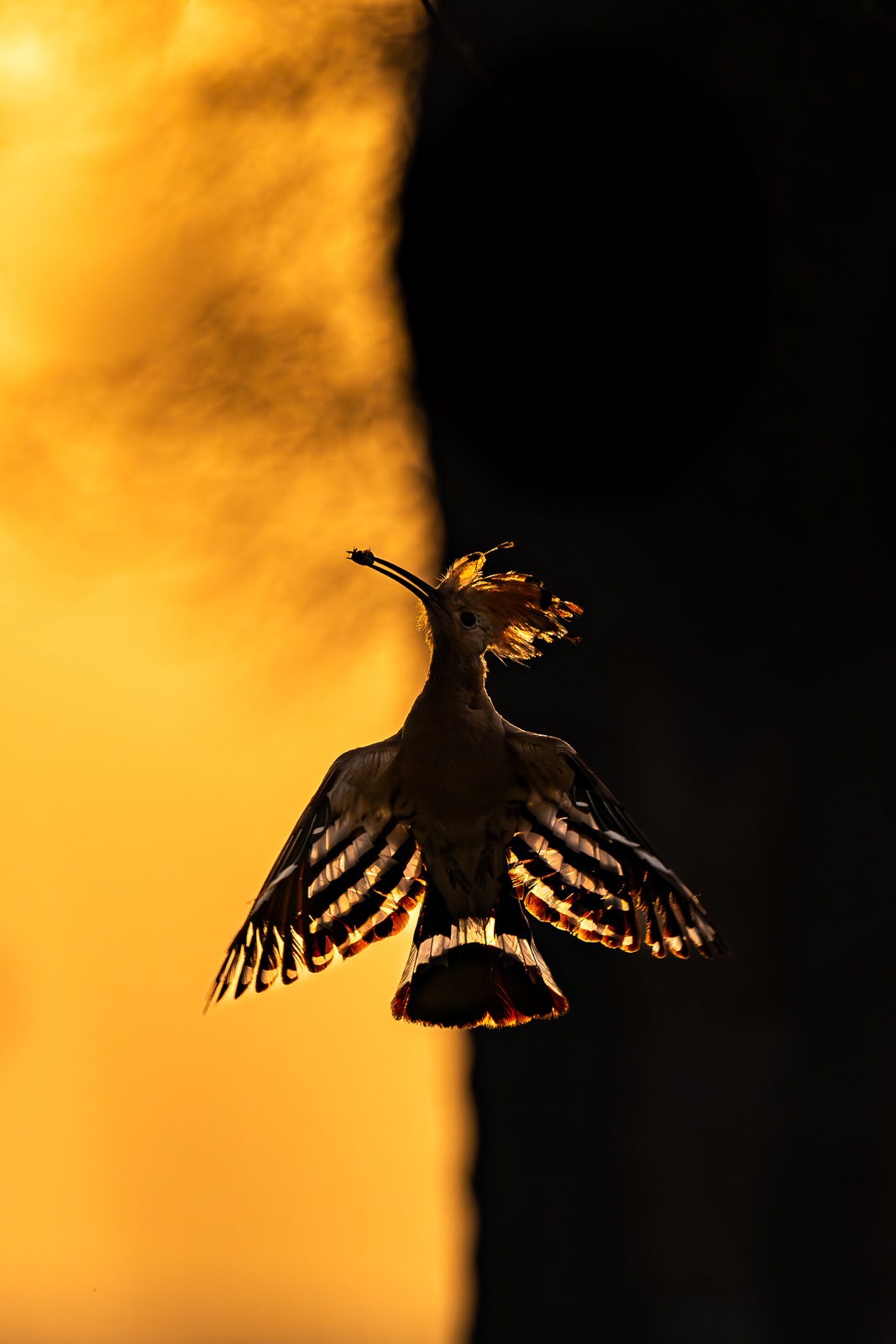
The Birds in Flight top spot was taken by Hermis Haridas, who explains how he managed his shot: "A Eurasian Hoopoe took flight with its wings spread in a smooth motion across the canvas of the early-morning sky illuminated by the sunrise’s bright hues. I saw that this bird would occasionally grab its prey in the air and other times on the ground. Additionally, I noticed that each time it caught prey, it flew in the same direction to a nearby tree. That was when I had the idea to photograph the bird against a background divided into dark and light, representing the contrasting sides of existence. The following morning, I returned to the same spot well before sunrise, eager to witness nature’s spectacle unfold once again. Anticipation heightened as the first rays of light bathed the landscape, and, true to my expectations, the hoopoe appeared in the distance, gliding gracefully towards the perch that was familiar from the previous day. With my camera poised and settings adjusted, I commenced capturing the unfolding scene. Among the flurry of clicks, I chanced upon a frame that resonated deeply with me – a moment frozen in time, brimming with unique charm. It was as if nature had bestowed upon me a gift, a singular composition that encapsulates the essence of the hoopoe’s beauty and grace. Indeed, many have remarked that this frame is a marvel that cannot be replicated – a testament to the serendipitous wonders that await those who seek them amid the natural world."
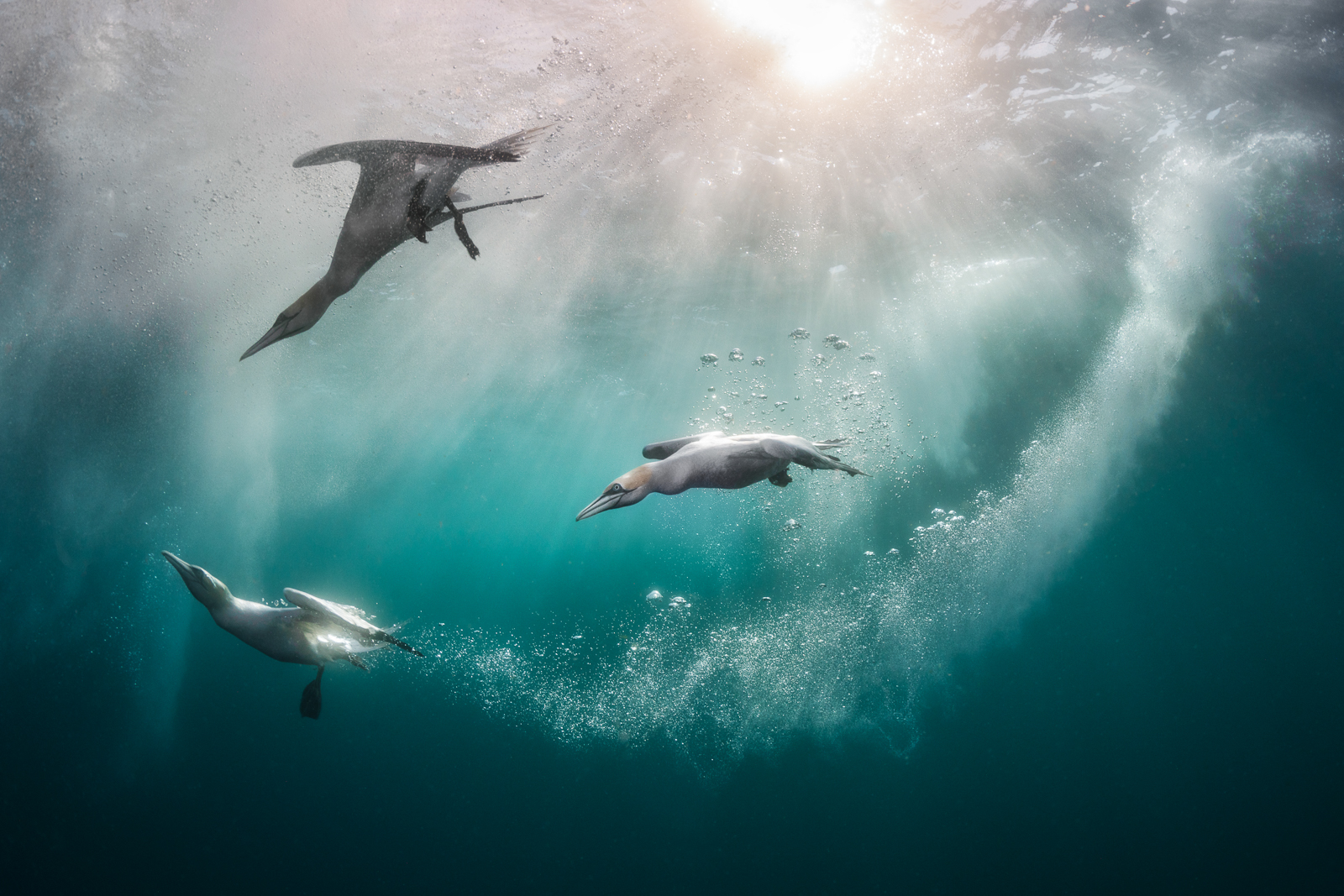
Kat Zhou took the top prize for the Birds in the Environment category, commenting: "Here we see a trio of Northern Gannets diving into the ocean on a sunny day in Shetland. The species is Scotland’s largest seabird, and they are remarkably adept in the water, with the ability to dive to depths as far as 22 metres. I took this photo while scuba diving from a boat near Noss, which is home to the UK’s seventh largest colony of Northern Gannets. In the past the population has been estimated at around 25,000 birds, though their numbers were unfortunately severely reduced by the avian flu outbreak. It is unclear when, or if, their population will be able to recover. Dead herring from a local herring fishery were used to attract the birds to the boat."
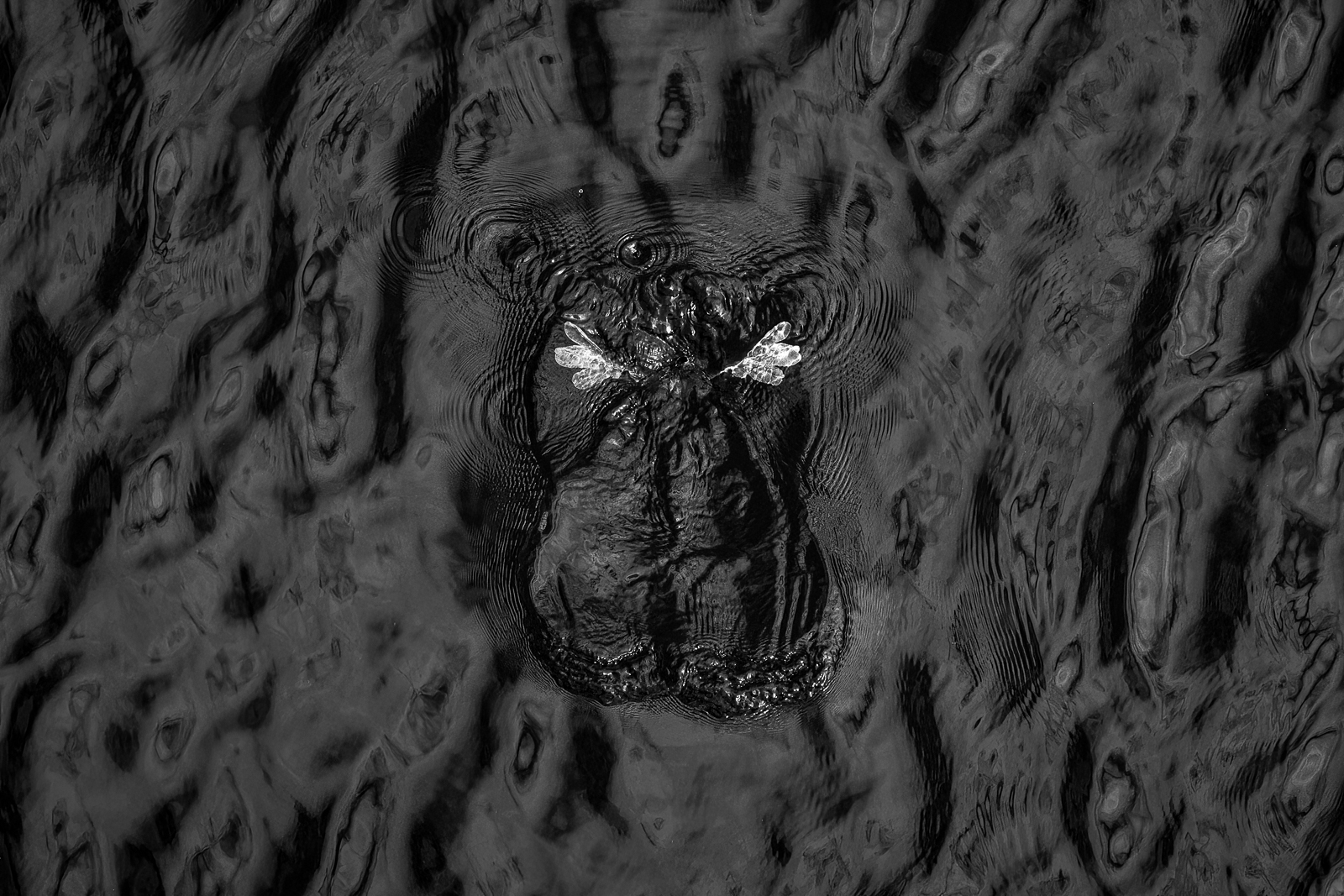
David Stowe's 'Hippo Impression' scooped the Black and White Gold Award. He said: "This photograph shows a Hoary-headed Grebe as it disappears below the surface of the water to feed, pushing into the depths with its huge paddle-like feet. I took the image from a raised platform high above the wetland. With a little bit of imagination, the combination of bird and ripples look like the head of a hippo."
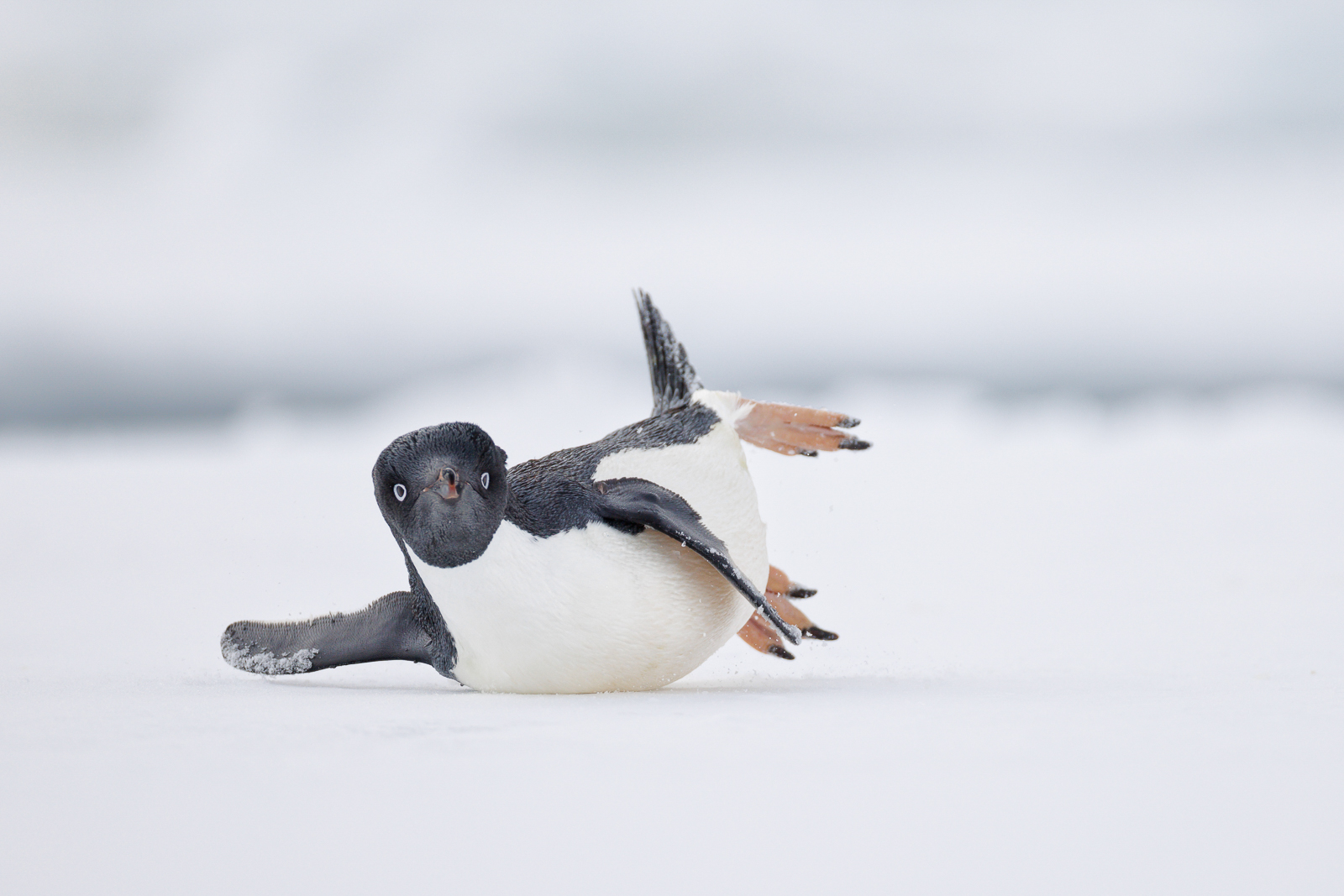
Nadia Haq's image of a penguin loosing its footing snagged the Comedy Bird Photo prize. She remarked: "I was sitting on a Zodiac next to my husband and 10-year-old son near Brown Bluff, Antarctica, when we spotted a group of Adélie Penguins on some sea ice. As we slowly approached them, they started to toboggan on the ice, and I captured one of them sliding as if performing a modern dance move."
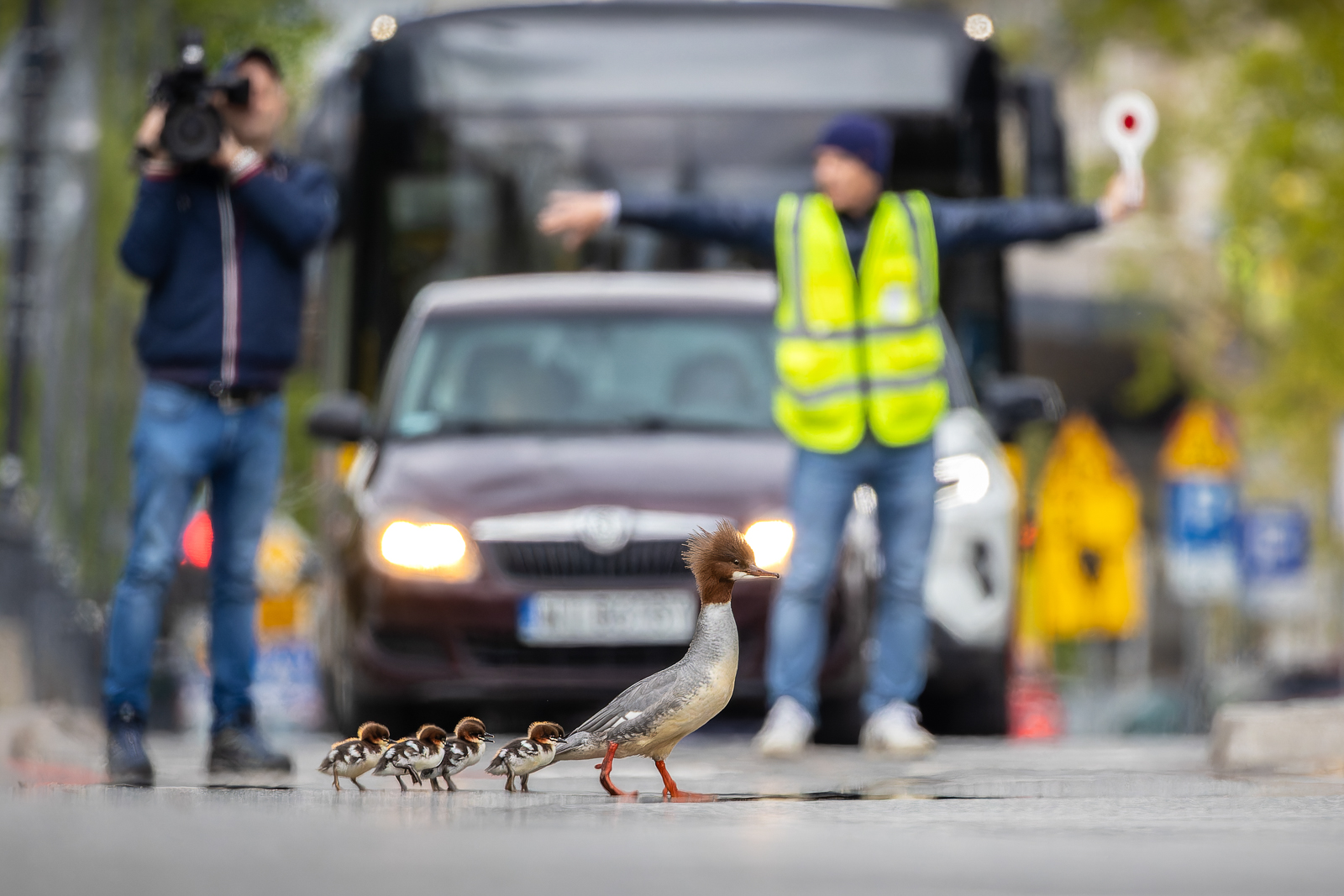
'Treacherous Journey', the Urban Birds category winner, was snapped by Grzegorz Długosz, who explained: "Goosanders breed in the park about 1 kilometre from Poland’s life-giving River Vistula. Each mother has to move her brood to the river as quickly as possible due to lack of food and safety in the park. They make the journey through a series of underground passages and over a six-lane highway. Each year a group of volunteers help them cross this deadly road by stopping the traffic. After crossing they arrive at the River Vistula where they can feed and grow. This image shows a mother Goosander crossing a smaller road because she decided not to use the scary and dark underground passage below it."
For younger photographers, there were three age-based categories – 11 and under, 12-14, and 15-17 – and this year 14-year-old Spanish photographer Andrés Luis Domínguez Blanco was crowned overall Young Bird Photographer of the Year winner for for his creative angle on a nuthatch scrambling down an oak tree.
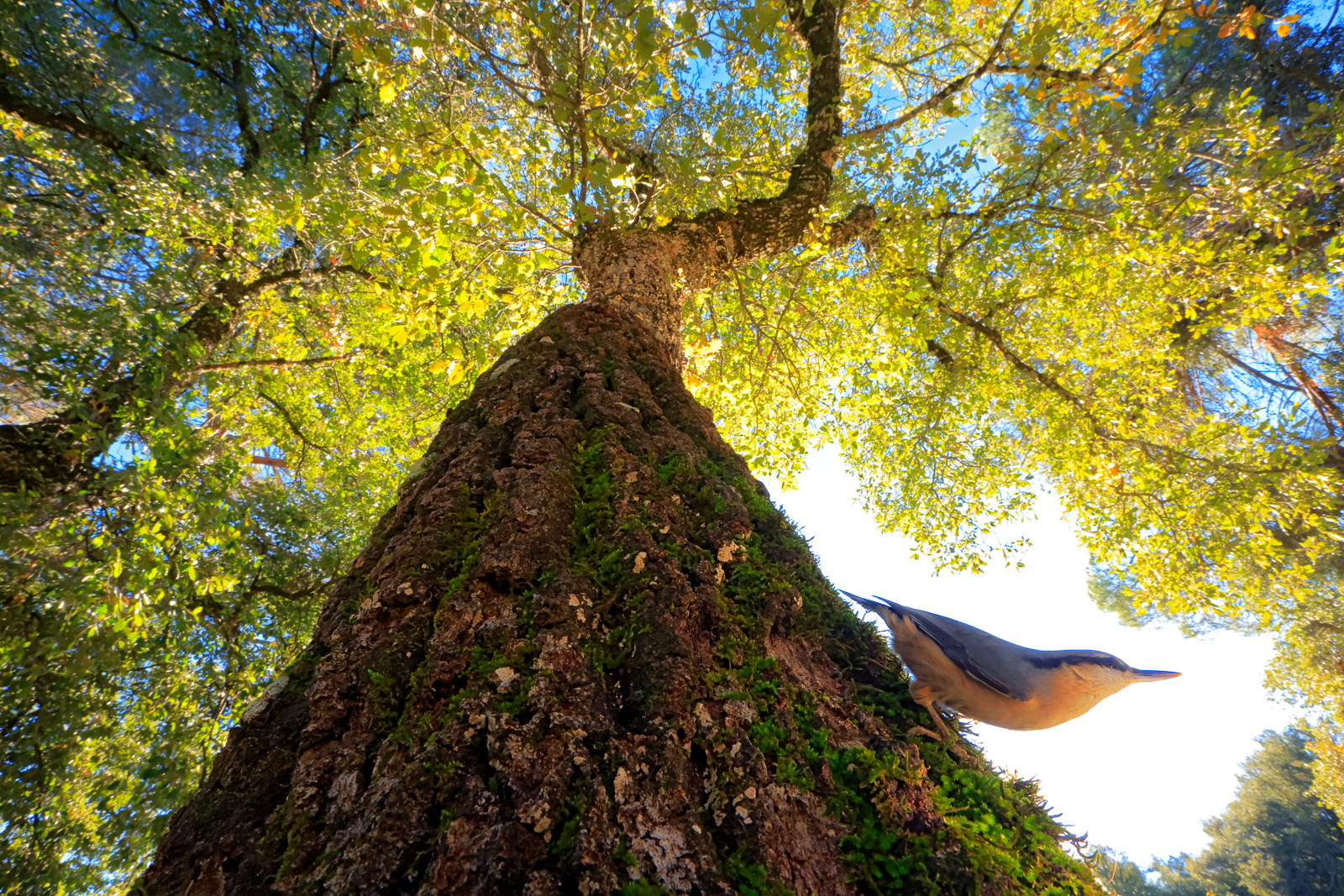
Young Bird Photographer of the Year Andrés Luis Domínguez Blanco proudly explained: "I photographed this Eurasian Nuthatch at Grazalema in southern Spain using a wide-angle lens. An oak tree next to a river provides cover for species such as woodpeckers and nuthatches coming down to drink. I was using a remote-control set-up, and I just had to wait. Since these species like to climb trunks, I thought about what their vision and perspective would be like."
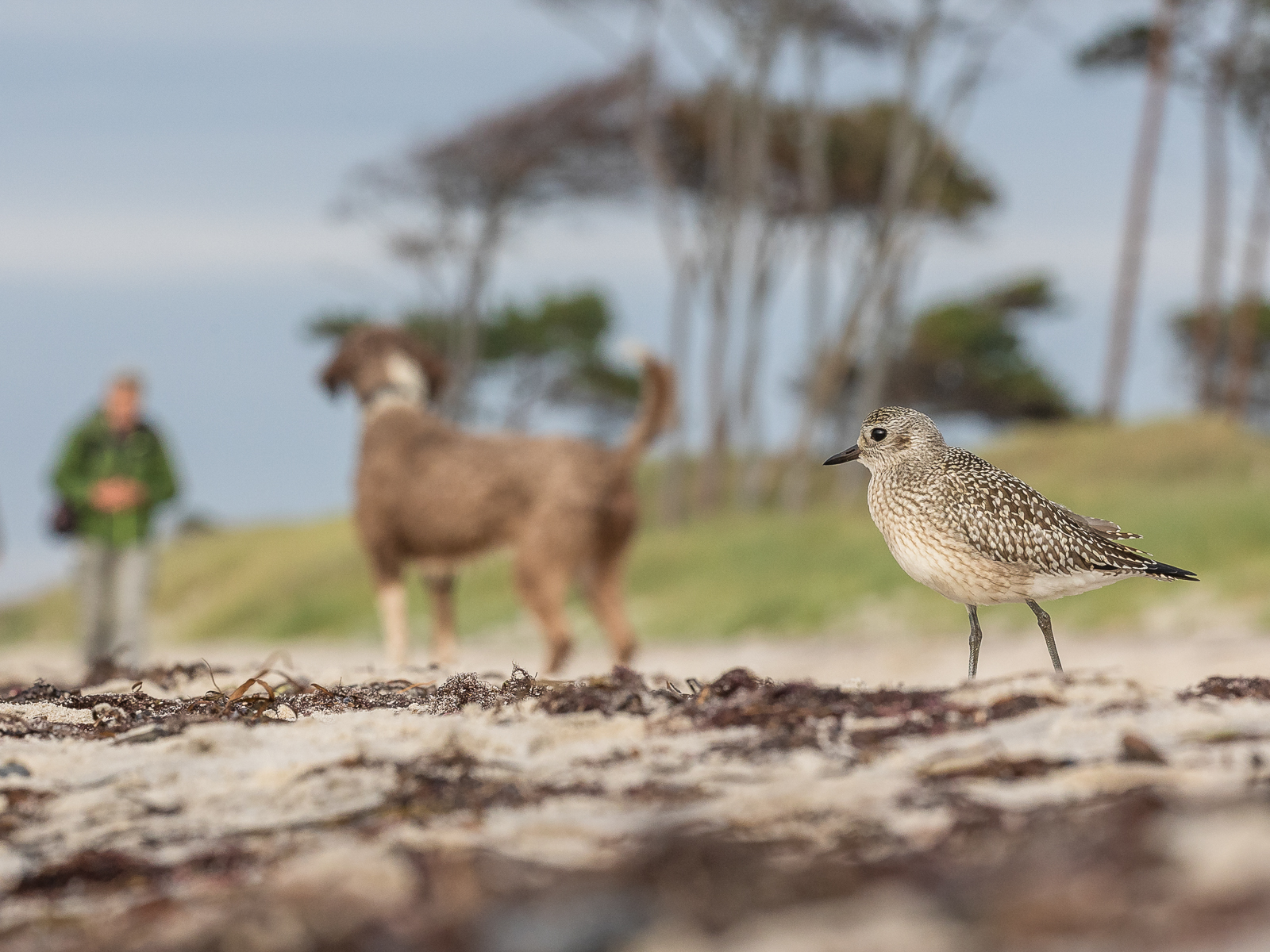
Emil Wagner won the 15-17 Years award "I took this photo on a beautiful beach on the Baltic Sea. There are a number of waders and other birds here, but also many visitors who enjoy the beautiful landscape. In this case there was also a dog who initially did not notice the Grey Plover. The Grey Plover, however, did notice the dog and flew away shortly after I took the photo. While I do not believe this incident greatly stressed the bird, it is crucial to acknowledge the potential impact of human activity and tourism on protected species and their habitats. In my opinion, the scene represents this potential conflict between humans and nature."
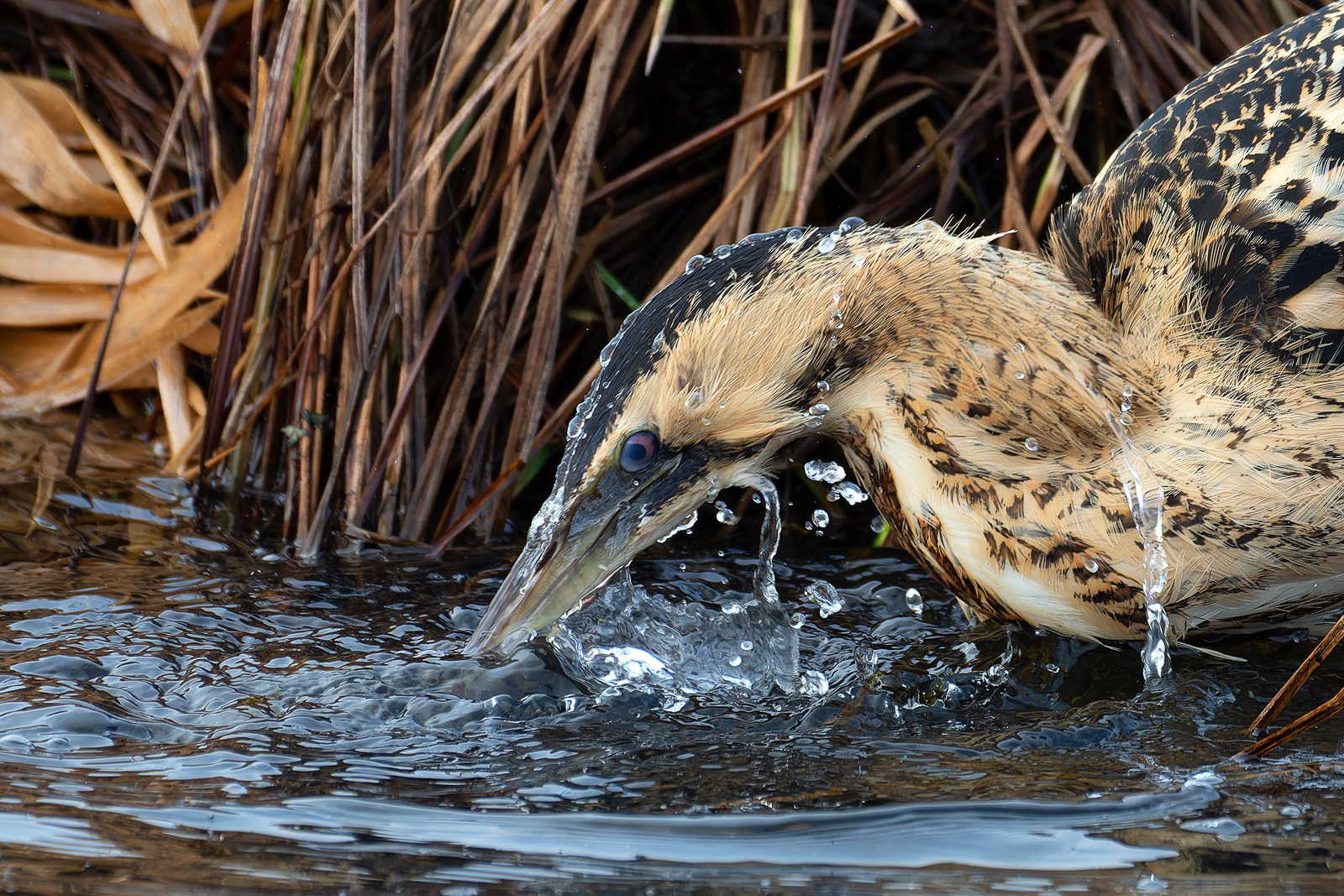
And finally, the 11 and Under winning shot was created by Julian Mendla: "Lake Federsee is a famous wintering area for numerous migratory birds. From November to March, Eurasian Bitterns are frequent visitors to this lake. As soon as the lake freezes over, these rare birds retreat to trenches through the reeds. Surprisingly, this individual was very close to the boardwalk that leads through the nature reserve. From there, I could easily watch its fishing campaign and take numerous photos."
This year, the competition donated £5,000 to partner charity Birds on the Brink, which provides funding to bird conservation projects around the world. Commenting on the winning image, Birds on the Brink trustee Paul Sterry stated: “The mark of a good photograph is one that either demonstrates artistry or tells a story. The mark of an exceptional one is that it does both. This is just such a photograph, portraying a tragic and often-overlooked aspect of man’s impact on the environment and an unintended consequence of our species’ high rise aspirations, which turns out to be yet another devastating threat to wild birds.”
The 2025 competition is now open for entries at birdpoty.com, and an accompanying hardback coffee-table book, Bird Photographer of the Year Collection 9, is also now available to buy.
You might be interested in our guide to the best bird feeder cameras and the best cameras for wildlife photography.
Also, don't miss our piece about using a full frame or cropped sensor for bird photography!







